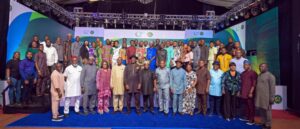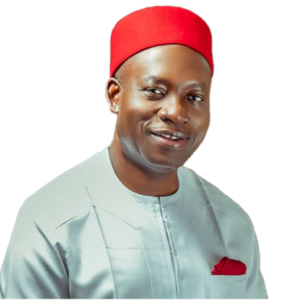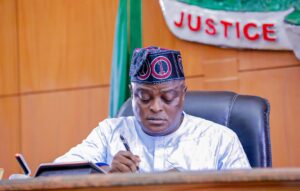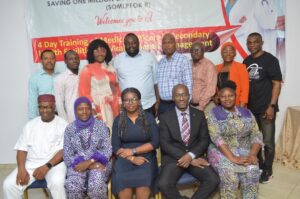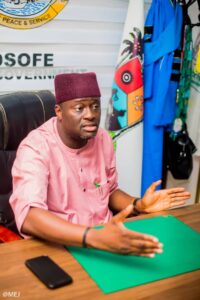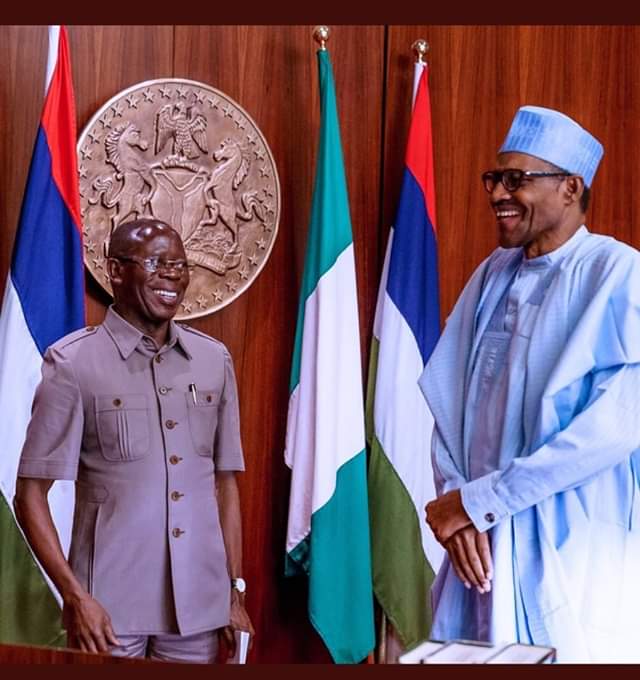
JOHN ALECEHNU takes a look at the recent turmoil within the ruling All Progressives Congress and posits that despite the recent truce, the threat to the proverbial thread which binds the APCs symbolic broom is real
The National Chairman of the All Progressives Congress, Adams Oshiomhole, and his supporters must be happy with the turn of events within the last 72 hours. Oshiomhole, like the proverbial cat with nine lives, seems to have survived the greatest threat yet to his position as the party’s helmsman.
Succour came his way on Monday, when an emergency National Executive Council meeting scheduled for Tuesday was postponed indefinitely. The aborted NEC meeting was convened by high-ranking party leaders and members of the National Working Committee opposed to Oshiomhole’s style of leadership.
The conveners of the halted meeting wanted him out. And they almost succeeded — but for what was considered as the timely intervention of a former Governor of Lagos State, Asiwaju Bola Tinubu and the President, Major General Muhammadu Buhari (retd.), his fate would have been sealed. By now, the former governor of Edo State would probably have become a former chairman of the ruling party.
The decision to postpone the event was announced at the end of a meeting of feuding APC governors with Buhari at the Presidential Villa, Abuja. The Chairman, Progressives Governors Forum, Abubakar Atiku-Bagudu, who spoke with reporters after the meeting, said the governors “urged” the President to support the postponement until they were able to resolve the issues within the party.
Party observers note that his comments are indicative of the fact that the dispute within the party is still far from over. It was perhaps a contrite Oshiomhole who admitted that mistakes were made, and that “lessons have been learnt” from the insurrection which almost cut short his constitutionally recognised four-year tenure.
After a series of open letters by concerned party members, a landmark court order granted by Justice Danlami Senchi of the Federal Capital Territory High Court, Jabi, Abuja, on March 4, set off a flurry of activities which polarised the party.
The court ordered Oshiomhole’s suspension from parading himself as National Chairman. Some of his NWC colleagues had approached the court to ask for the order suspending him from office which was granted. Without wasting time, the aggrieved members proceeded to take steps to give effect to the temporary court victory.
Although Oshiomhole got an order of a similar court in faraway Kano quashing Sanchi’s court order, his opponents, who obviously enjoyed the support of powerful forces in government, went ahead with their conspiracy. The APC national chairman has since asked for forgiveness and taken steps to douse tension by lifting the suspensions earlier imposed on some of his colleagues. The rest, as they say, is history.
A senior lecturer at the Department of Political Science, University of Jos, Joseph Anuga, likened the crisis within the APC to a volcano which erupts “every now and then.”
Anuga said, “Those who formed the party were people whose main and, perhaps, only objective was getting rid of the then Peoples Democratic Party. While coming together, they refused to put in place measures to stop what happened to the party they chased out from happening to them.
“They knew the PDP had failed and most Nigerians were tired. So, some of them, who were even foundation members of the PDP, simply abandoned the then sinking ship.” According to him, visible signs still exist of an impending implosion. He said an implosion could only be averted if proper steps were taken to address genuine concerns raised by stakeholders.
The political scientist stated that the party must put in place processes and procedures to carry out simple tasks as basic as screening credentials of those seeking party nominations as well as having a standard process for electing standard bearers.
“Whatever peace you notice in our political parties at the moment is due, in part, to the fact that elections are still far away. We can’t get the best of democracy this way,” he added.
Anuga further stressed that what was happening in the APC was being replicated in other political parties in one form or another, but that the APC was getting the lion’s share of media attention because it is the party in power.
Observers are of the opinion that the APC had long before the 2019 general elections struggled to deal with the ghosts of its ward and state congresses as well as its rancorous primaries.
For many party members, the fear of returning to opposition in just a little over four years after defeating the then ruling PDP was stronger than any feeling of personal injury arising from the APC’s controversial congresses, which were made worse by less-than-transparent primaries which followed.
Assurances that those who lost in their quest to get the party’s endorsement for elective offices will be compensated acted as an elixir for most who were tempted to try their popularity elsewhere.
Thus, they worked hard to retain power at least at the centre. National Coordinator of the APC Aspirants Forum, Lt. Col. Abdulaziz Yar ’Adua (retd.), captured the mood among this category of party members who aspired but lost in the scramble for the party’s tickets in the run-up to the 2019 elections.
While speaking at one of the forum’s meetings in Abuja, recently, he said, “Everybody knows what happened in 2019. The primaries conducted by the APC had a lot of challenges, like any other party.
“But in our own case, because of the respect and the loyalty we have for the President, we decided to come together to calm ourselves down and to do the needful, which was what we did; to come together, work for the success of our party and you can see we have won, our president is back, most of our governors are back, and even those we contested against, we assisted and made efforts to make sure they won.”
His colleagues at the forum however decried the decision of the party to renege on promises made to them before the elections. The North Central Publicity Secretary of the forum, Olufemi Urrah, said, “We were asked to be patient until the party wins the election and returns to power; that has happened but we are still here. We have been abandoned.”
Saddened by the turn of events, some of those who felt sidelined in the scheme of things, have begun moves to take over the party’s structure. A leading member of the party’s top echelon, who confided in SUNDAY PUNCH, said, “The last has not been heard about this matter,” referring to the struggle for the soul of the party.
The source further said, “So many of our colleagues in the struggle to make this party better felt insulted by the tone of the letter written by Bola Tinubu.
“He spoke as if he was talking to his children, comparing people to the deadly coronavirus. At the appropriate time, as we say in Africa, water will find its level.”
The former APC Deputy National Chairman (South), Segun Oni, who is so far the highest-ranking member of the party who has dropped the party’s broom in what some analysts say is a sign of things to come, said he and his supporters were leaving the party because it had failed to uphold basic tenets of democracy.
He explained that they were leaving the APC to return to the opposition Peoples Democratic Party because, having tasted the processes and procedures within the two parties, the PDP came top in terms of democratic culture.
Oni described the absence of internal democracy in the APC as “a ticking time bomb.”
He told SUNDAY PUNCH in an interview in Abuja, “In my own state, there was no primary. They handpicked. The worst thing is that, for those people who paid to have primaries, they were not allowed to participate in the primaries and their monies were not returned to them.
“They are party members. How can you treat your members like that? Taking money from them and not giving them an opportunity to contest? And you are not even returning their money to them to say, ‘We are very sorry, please have your money.’ Maybe they would think and maybe, by tomorrow, they will take a decision at the working committee to return the money of everybody who paid to contest primaries for whom no primary happened all over Nigeria.”
Oni’s supporters in his home state of Ekiti have already matched words with action as they have ditched the APC. They accused the Governor Kayode Fayemi-led administration of “nepotism and clannishness in appointments” across the board.
Ife Arowosoge, Director General of ‘Atunse Ekiti’, Oni’s campaign organisation during the last governorship elections, stated that the decision to leave the APC was a collective one taken by the former governor’s loyalists.
He said, “The PDP made mistakes and apologised, but things are getting worse in APC. It is our observation that Ekiti APC does not believe in democracy from ward, local government and state levels, while the appointments to government positions at the state and federal levels are limited to family members, friends and associates of the governor.”
However, the APC National Vice Chairman (South), Hilliard Eta, said, “Our party is a democratic entity and in every democratic setting, there are bound to be interests, disagreements and later agreements. Such things are evidence that the party is alive. People, especially politicians, love to associate with the party in power.
“So, the interest being shown in our activities is normal. We will come out of our challenges stronger. Just like our chairman, Adams Oshiomhole, said, ‘The opposition is definitely disappointed that peace has returned to our party.’’
Events in the next few days will determine whether the opposition is actually disappointed or if the celebrated temporary peace in the ruling party will be permanent or not.






